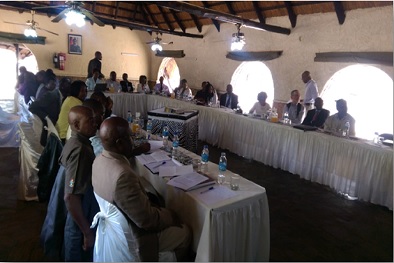The meeting set out to achieve a number of objectives namely: to present to the stakeholders the approved Terms of Reference (ToRs) for the Zimbabwe Stakeholders Committee for the Zambezi, to promote stakeholder involvement in water issues in the basin and ensuring the implementation of the ZAMCOM strategies, to provide a platform for stakeholders to contribute into ZAMCOM strategies and to link ZAMCOM Secretariat activities and national “thinking” in basin cooperation, coordination and development issues.
In giving the welcome remarks, Mr Tinaye Mutazu, the Director of Water Resources Planning Management noted that among the seven catchments in Zimbabwe, Manyame, Mazowe, Sanyati and Gwayi are located in the Zambezi Basin. He reiterated the importance of integrated transboundary cooperation in the Zambezi Basin which is shared by 8 riparian countries (Angola, Botswana, Malawi, Mozambique, Namibia, Tanzania, Zambia and Zimbabwe).
Professor Zebediah Phiri, ZAMCOM Executive Secretary in giving his welcome remarks at the meeting expressed his delight at the level of commitment given by different stakeholders who had attended. He further noted that stakeholder engagement is a useful link to the people in the Zambezi Basin and should not be overlooked.
A presentation on the Zimbabwe Stakeholders Committee for the Zambezi ToRs was given by Mr Zvikomborero Manyangadze, MEWC who highlighted that the ToRs were developed in 2010 and were officially adopted in 2012. Among some of the key activities of the Committee highlighted were the following; linking ZAMCOM activities with national “thinking”, supporting ZAMCOM in its communication strategy, organising training workshops and facilitating contact between ZAMCOM Secretariat and national stakeholders.
Ms Evelyn Gope, WACDEP Zimbabwe gave a presentation on the overview of the WACDEP programme and progress to date on the work that has been undertaken. Presentations from the Climate Change Management Department, Meteorological Services Department, ZINWA, Civil Protection Unit were also given where each stakeholder had the opportunity to share with other participants the work they are actively undertaking.
Manyame, Mazowe, Sanyati and Gwayi Catchment representatives also gave an update on what is happening in their Catchments, challenges being faced and also suggested recommendations to alleviate the shortcomings. Major challenges that were touched on by the Catchment representatives were the lack of enforcement of existing legislation, lack of funds, siltation, and pollution of water bodies and drilling of boreholes by communities without permits.
In mapping the way forward the participants identified an administrative committee with the Chairperson represented by the MEWC, Vice Chairperson represented by Catchment Managers who will rotate after one year tenure in office and Institute of Water and Sanitation (IWSD) being appointed as a member who will also retain one year tenure. The administrative committee was tasked with meeting and mapping the way forward and ensuring the road map is agreed on in January 2016 so that the Programme will kick start as the year begins.
